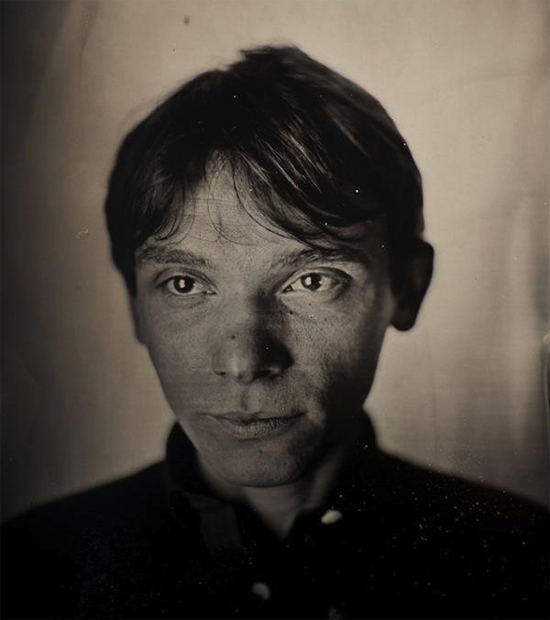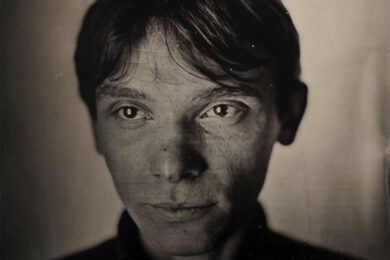It’s perhaps rare that an "obsession with ‘A Night To Remember’ by Shalamar" is cited as a defining source of sonic inspiration. But for David Brewis, one half of sibling duo Field Music, the 80s funkateers’ kitsch classic is a perfect example of the music that has influenced the pop funk and clipped disco beats of Old Fears, the new album from his solo project, School Of Language.
"That Shalamar track is sublime," Brewis tells me in his soft North East accent. "I’ve also spent a portion of the last two years being completely obsessed with the first two Justin Timberlake albums. I went back to my Michael Jackson records, especially Bad, which was the record I loved most as a child. I listen to it now and it is a beacon of excessive modernity. It’s so ambitious."
We are sat in a small kitchen area next to a BBC radio studio at the swanky Media City in Salford. School Of Language have just played the first of four songs on Marc Riley’s BBC 6Music show. It’s the first time Brewis has played the new material in public and the track, ‘Dress Up’, sounds fantastic – three minutes of taut, upbeat funk. Afterwards I tell him that the song wouldn’t have sounded out of place on Prince’s classic 1981 album Dirty Mind. "Thanks. I’m fine with that. It would be enough for me if any of my songs could sit alongside an early Prince album, and Dirty Mind is the early Prince album that is nice and concise."
After discussing the merits of each pre-1988 Prince album, Brewis returns to the theme of why Old Fears is his – and he seems happy for me to use the term – funkiest record to date. "It is the stuff I like more than the bands who people associate with Field Music. People associate us with proggy-leaning things like XTC, and actually that’s not my music. So, I’ve actually been trying to represent some of my pop and funk influences in the music I have been making. The feeling of wanting to do that has grown to the point where it wouldn’t have made sense to do a few of these songs within a Field Music album. It had to be something more cohesive."
And while it is very cohesive, Old Fears was a record created in brief gaps during an extremely busy time for Brewis. When Field Music announced a hiatus after touring 2012’s Plumb, their first album to bag a Mercury Prize nomination, David embarked on a succession of mini-projects. He assembled and played in Eleanor Friedberger’s touring band, produced albums for Maxïmo Park [Too Much Information] and his brother Peter Brewis’ collaboration with that band’s Paul Smith. Brewis also performed a score for an 85-year-old silent documentary (Drifters) as well as remixing tracks for a number of artists including Dutch Uncles, whose signature twitching funk contains similar DNA to the compact grooves that light up Old Fears.
After Field Music went on hiatus, Brewis recalls, "there was definitely no break" before restarting his solo project, which had been mothballed since 2008’s Sea From Shore debut. "I had an idea I was going to do a School Of Language record from when we were touring Plumb. I spent a lot of 2013 writing various bits of music and working on quite small projects, and the recording of this album was done in the free slots in between."
The idea of working on several projects at once seems to have been a success. "I had an amazing time," David reveals. "I love always being stimulated. It’s my worst nightmare to play the same set 80 times in a year. Well, not quite. Maybe woodlice are my worst nightmare."
Woodlice are a ‘worst nightmare’? "Yeah, I really hate them."
If the sonic blueprint of Old Fears was set by Timberlake, Dirty Mind and Shalamar, Brewis has stated that the emotional core of the album was inspired by revisiting a pivotal period during 2001 when he was 19 years old. I suggest to him that I’d hate to revive my memories of being that age, and that I was a complete dick when I was 19. "That’s why I had to do it," he replies. "I wanted to do things that were really personal. I’m an anxious, weird person and, rather than ignore that and pretend I’m a really nice person, I had to talk about the things I’m really anxious about, and also therefore about the things I love."
Why 2001? "Well, that year I finished university and put out my first record and signed my first publishing contract. I also met my wife and moved out of home and moved in with her. Everything that happened resulted in me going from being quite an insular person to being a less insular person. I had to learn to cope with many anxieties. It was a huge turning point."
These anxieties lie within the heart of Old Fears, and have given Brewis the opportunity to further understand his foibles and frailties. "I went to university in Sunderland and stayed living at home. I didn’t speak to anyone for three years, because I had my own life and I was incredibly arrogant. I had my music going on. I was too busy to make friends at university. But I can’t disown the me of then. So, going to university and not speaking to anyone is still me. It’s still what I am like, and I cannot erase it. I probably shouldn’t regret it, even though I see that it was weird. I was weird. That weirdness is still there, but I can now cope with it."
A few minutes later, I watch David and his superb band, who include a couple of Futureheads and Peter Brewis on drums, deftly pick their way through the shimmering ‘Suits Us Better’ and the spiky proto-funk of ‘Distance Between’. I’m struck by the overlapping subtleties of the musical continuum that binds Field Music, School Of Language and Peter’s solo project, The Week That Was. "Peter and I do everything together," David says, when asked how he differentiates between the music he creates. "The difference between the projects is how we decide who is in charge. So, with a School Of Language record, I am in charge. With a Field Music record we have to alternate, and we alternate who’s in charge song by song. Field Music is, as Peter describes, an alternating dictatorship."
So, it would appear that, to a certain extent, even a Field Music album is a series of tiny solo projects, living together in harmony. David nods at this assertion. "What people maybe don’t realise is the extent of the nature of our collaboration. It’s not like I bring chords in and we throw words around and write new songs together. We’ve pretty much never done that. Our collaboration is about taking turns to support the other to whatever level is needed."
At this point David nips back into the studio to play a final song. And while Brewis is a fantastic musician and the track (‘Small Words’) sounds flawless, he returns unsure of his performance and admits to have been deeply anxious about the Riley session. "School Of Language is me as a solo artist and I cannot hide," he says. "I want to draw people in and at the moment it feels nerve-wracking because it’s not really me. Or it hasn’t been me."
Why would that would be more terror-inducing than performing as part of Field Music? "Well, Field Music have probably been a bit standoffish – not in a negative way, but we ask a lot of our audience. It’s like [we say] "this is how we play, this is how we present it and we will do it well, but if you want to be engaged then it’s all down to you."
Despite Brewis’ assertion that he and his brother make "standoffish" music, Field Music’s most recent album – 2012’s Plumb – garnered both critical acclaim and a Mercury Prize nomination. The highlight of that 2012 awards show was a series of tweets from David’s wife, who brilliantly conveyed the band’s ‘fish-out-of-water’ experience. "The award show was a culture clash," he reflects. "The whole thing made us feel very, very DIY. We don’t swan around with managers or crew. We are a small band and have to do the work ourselves. That day, we were assigned a runner and the poor lad didn’t know what to do with us, as we were trying to take him out for a coffee. We tried our very best to do the show our way. Afterwards we managed to put on a party in a pub for 30 people with free food and free booze for the price of two tickets to the award show."
That’s all very noble, but just how disappointed was Brewis when Alt-J were announced as the winners? "I did really want us to win, but it would have been weird. The music industry would not have known what to do; everyone knows we could never be huge."
It’s a characteristically humble comment, but there was a sense that the 2012 Mercury Prize could have been Field Music’s ‘Elbow moment’ and a win could have thrust them deep into the wider public’s affection, just as it did when Guy Garvey’s band scooped the same award in 2008. "I heard that [comparison] too, but Guy Garvey is absolutely brilliant at connecting with people. We make music about not feeling connected. I’ve made a record about being disconnected from other people, and this is the most accessible record I’ve ever done. We played with Elbow at Jodrell Bank. Elbow were brilliant, and Guy was brilliant at making everyone connect with this communal feeling and, actually, I don’t want to make that type of music."
Brewis spots my quizzical expression before continuing with his gentle rant. "I don’t want us to all feel like we’re in it together, because I don’t believe that. I feel like people are apart and I feel apart from people a lot of the time. I don’t think I would feel better if I pretended that I didn’t feel that way. I’m not going to get over my feelings of isolation by pretending we are not all isolated. That would be really dishonest music on my part."
So it would appear unlikely that either School Of Language or Field Music will be delivering their festival-headlining crossover album any time soon. "It would be impossible for us," agrees Brewis. "While Peter and I both love pop music – and we feel like we make a kind of pop music – we will never make a broad brushstroke crossover album. For us it is the intricacy and the subtlety of music that draws us in. We want to blow that subtlety up and magnify it so people can see it."
The album Old Fears is out on 7th April via Memphis Industries.
School Of Language plays the following dates in April:
APRIL
7th – Newcastle, The Cluny
10th – Paris, Point Ephemere
22nd – Bristol, Exchange
23rd – London, The Lexington
25th – Glasgow, Broadcast
26th – Leeds, Brudenell Social Club
28th – Manchester, Deaf Institute



